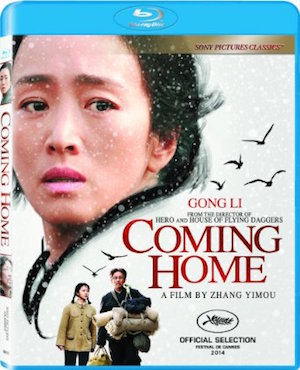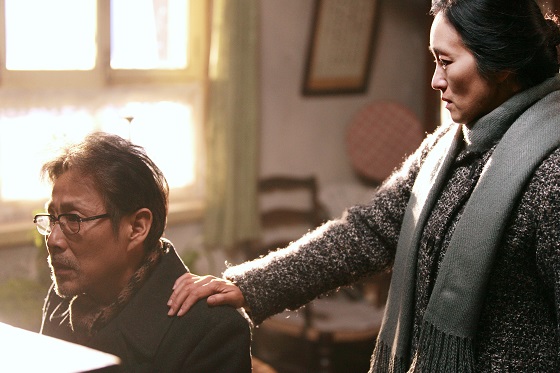Wars come in a lot of shapes and sizes, not to mention temperatures vis a vis hot and cold. Yet perhaps the most destructive wars are those fought internally, by governments against their people: a process that subverts the fundamental nature of that sacred relationship. Director Yimou Zhang’s heartbreaking picture, Coming Home (out on Blu-Ray today), is the story of one family as a microcosm of what can happen to people when governments persecute rather than protect.
The picture opens in the mid-1970s, during the waning years of China’s Cultural Revolution. For those unfamiliar, this upheaval saw Mao Zedong rise back into the driver’s seat of China’s political apparatus through a series of internal coups and socio-political reforms. This Cultural Revolution involved mass purges throughout all levels of Chinese society, from the highest bureaucratic levels to the lowest regional corners. Mao charged that capitalist, bourgeois enemies within China had corrupted his purely socialist vision, and that these elements needed to be rooted out and dealt with. Hundreds of thousands died, and millions more were displaced during this ten year period.
As Coming Home opens, teenage dancer Dandan (Huiwen Zhang) learns that her father, formerly a college professor and now a prisoner of the state, has escaped. Dandan and her mother, Yu (Li Gong), sit through a debriefing by a party official, who lets them know in no uncertain terms that any contact with this enemy of the state is forbidden, and could get them in serious trouble. Although Yu seems reluctant to promise that she’ll turn over her husband, Dandan, who has grown up during the Cultural Revolution and been smothered with its propaganda, seems all-too willing to fork over her “traitor” father. Unfortunately for her dad, Lu (Daoming Chen), Dandan gets her chance when Lu makes an attempt to contact his family. In the aftermath that follows, Lu is recaptured, and in trying to help her husband, Yu takes a nasty blow to the head.
The film then jumps ahead three years, after the end of the Cultural Revolution, when Lu is released from captivity. Dandan meets her father once he returns, yet it is obvious that something is bothering the young woman, a consideration Lu brushes aside so that he can rush home to see his wife. Once there, Lu is devastated to learn that his spouse has a peculiar form of amnesia that manifests in her inability to recognize Lu. Although Dandan, the neighbors, and even party officials assure Yu that the man before her is indeed her husband, she refuses to believe it.
The movie follows from here as an exploration of Lu’s efforts to jump-start his wife’s memory, along with a reconciliation with Dandan. And while the events of Coming Home are set against the backdrop of the Cultural Revolution as an instrument of terror and oppression, the overriding theme of the picture is understanding and forgiveness. Although Lu has every right to be mad at his daughter for turning him in, he’s quick to forgive her, and actually apologizes for missing so much of her childhood. For American audiences, this is a very notable shift in the expected paradigm, for instead of harnessing all of this negative energy to deliver chest-pounding speeches or hair pulling rants, Lu and Dandan are instead wholly focused on Yu, and what can be done to cobble their family back together.
Yimou Zhang does masterful work allowing his actors to hit the emotional notes necessary to move the story’s key beats forward, which they do brilliantly. If great filmmaking is the practice of showing instead of telling, then Zhang gets the highest possible marks; the man wisely trusted in his magnificent cast to carry the dramatic weight of the story via pensive glances, exhausted sighs, and quiet resignations. Although state censorship obviously kept any overt criticism of Mao or China’s policies out of the picture, the story of Lu, Yu, and Dandan perfectly convey the devastating impact the ten-year purge had on Chinese society. Lu’s repeated attempts to get his wife to recognize him through pictures, music queues, and old letters represent the struggles of perhaps billions who had to try and piece their lives back together after the Cultural Revolution. Whether or not this is even possible forms the basis for this film’s key question, and to Zhang’s credit, he makes sure Coming Home confronts this honestly.
The Blu-Ray has a director Q&A feature that highlights Zhang’s thematic efforts in this regard, for he states that Lu’s persistence and dedication to his family are decidedly Chinese qualities that he wanted to celebrate. During this Q&A, Zhang also talks about the hurdles his production faced in terms of government censorship (there aren’t any scenes of prison or labor camps as a result), and elaborates on some of the details of the shoot in terms of its locations. Although just under 20 minutes long, this Q&A does offer a lot of great insights into the production of the film, and is a great addition to the Blu-Ray’s special features.
Sadly, the only other feature included is a director’s commentary, which covers many of the same themes raised in that much shorter Q&A segment. Comprehensive, and very informative, the commentary would have been considerably more engaging if it came with some deleted scenes, or a making-of featurette to compliment it. As a picture, though, there’s little fault to find in Coming Home, which tells a heartbreaking story using components of a cultural upheaval that most of the world, China included, knows little about. Were this the only thing the film had going for it, the experience would still be worth a couple of hours, yet buoyed by subtle, nuanced performances, tight pacing, and magnificent scene composition, Zhang’s film is so very much more than a good story: it’s a cinematic metaphor for humanity’s best and worst qualities.








Comments on this entry are closed.